When it comes to high-performance materials, titanium alloys are often the star of the show. These powders are essential in various industries, ranging from aerospace to biomedical applications. But what exactly are titanium alloys powders? How do they work, and what makes them so special? This guide dives deep into everything you need to know about titanium alloys powder, offering a thorough and engaging exploration of this fascinating subject.
Overview of Titanium Alloys Powder
Titanium alloys are a mix of titanium and other elements, designed to improve properties such as strength, corrosion resistance, and weight efficiency. The powdered form of these alloys is particularly valuable for applications in additive manufacturing, coating processes, and more.
Key Details of Titanium Alloys Powder:
- Composition: Varies by alloy type; often includes elements like aluminum, vanadium, molybdenum, and others.
- Propriétés: High strength-to-weight ratio, excellent corrosion resistance, and biocompatibility.
- APPLICATIONS: Widely used in aerospace, medical implants, automotive industries, and sports equipment.
- Caractéristiques: Available in various particle sizes, purity levels, and manufacturing processes such as gas atomization, plasma atomization, and mechanical alloying.
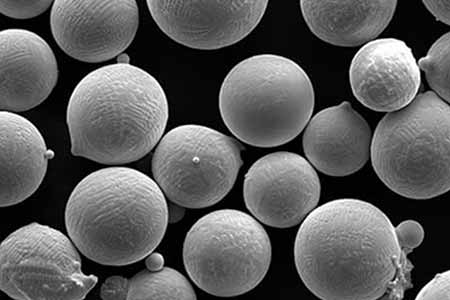
Types of Titanium Alloys Powder
Titanium alloys powders come in several distinct types, each suited to specific applications. Here are some of the most notable ones:
List of Specific Metal Powder Models
- Ti-6Al-4V
- Composition: 90% Titanium, 6% Aluminum, 4% Vanadium.
- Propriétés: High strength, excellent corrosion resistance.
- APPLICATIONS: Aerospace components, medical implants.
- Ti-6Al-2Sn-4Zr-2Mo
- Composition: 90% Titanium, 6% Aluminum, 2% Tin, 4% Zirconium, 2% Molybdenum.
- Propriétés: Superior high-temperature performance.
- APPLICATIONS: Jet engine parts, high-temperature structural components.
- Ti-5Al-2,5Sn
- Composition: 92.5% Titanium, 5% Aluminum, 2.5% Tin.
- Propriétés: Good creep resistance.
- APPLICATIONS: Aircraft airframes, high-stress components.
- Ti-3Al-2,5V
- Composition: 94.5% Titanium, 3% Aluminum, 2.5% Vanadium.
- Propriétés: High fatigue strength.
- APPLICATIONS: Aerospace hydraulic tubing, sporting goods.
- Ti-15Mo
- Composition: 85% Titanium, 15% Molybdenum.
- Propriétés: Enhanced toughness and ductility.
- APPLICATIONS: Medical devices, chemical processing equipment.
- Ti-10V-2Fe-3Al
- Composition: 85% Titanium, 10% Vanadium, 2% Iron, 3% Aluminum.
- Propriétés: Excellent strength-to-weight ratio.
- APPLICATIONS: Aerospace fasteners, automotive components.
- Ti-6Al-6V-2Sn
- Composition: 86% Titanium, 6% Aluminum, 6% Vanadium, 2% Tin.
- Propriétés: Good fracture toughness.
- APPLICATIONS: High-performance aerospace parts.
- Ti-6Al-2Sn-4Zr-6Mo
- Composition: 82% Titanium, 6% Aluminum, 2% Tin, 4% Zirconium, 6% Molybdenum.
- Propriétés: High strength and thermal stability.
- APPLICATIONS: Aerospace engine components.
- Ti-8Al-1Mo-1V
- Composition: 90% Titanium, 8% Aluminum, 1% Molybdenum, 1% Vanadium.
- Propriétés: Good weldability.
- APPLICATIONS: Aircraft structures, pressure vessels.
- Ti-6Al-2Sn-2Mo-2Cr
- Composition: 86% Titanium, 6% Aluminum, 2% Tin, 2% Molybdenum, 2% Chromium.
- Propriétés: High temperature strength.
- APPLICATIONS: Jet engines, space vehicles.
Propriétés et caractéristiques des Poudre d'alliages de titane
Titanium alloys powder exhibits a variety of properties that make them invaluable in many fields. Here’s a detailed look at these properties:
Detailed Properties:
| Propriété immobilière | Description |
|---|---|
| Force | Titanium alloys offer exceptional tensile strength, often outperforming many steels, which is crucial for load-bearing applications. |
| Weight Efficiency | With a high strength-to-weight ratio, these powders are ideal for applications where weight savings are critical, such as aerospace and automotive. |
| Résistance à la corrosion | Titanium alloys are highly resistant to corrosion, even in harsh environments like seawater, making them perfect for marine applications. |
| biocompatibilité | Due to their compatibility with the human body, titanium alloys are widely used in medical implants and devices. |
| Stabilité thermique | These alloys maintain their properties at elevated temperatures, which is essential for aerospace and industrial applications. |
| Usinabilité | While generally more difficult to machine than other metals, specific alloys and powder forms can be tailored to improve machinability. |
| Formabilité | Titanium alloys can be formed into complex shapes, particularly through additive manufacturing processes using powder forms. |
| Recyclabilité | Titanium is highly recyclable, reducing the environmental impact and making it a more sustainable material choice. |
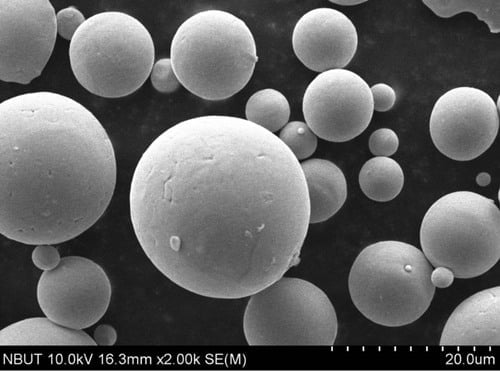
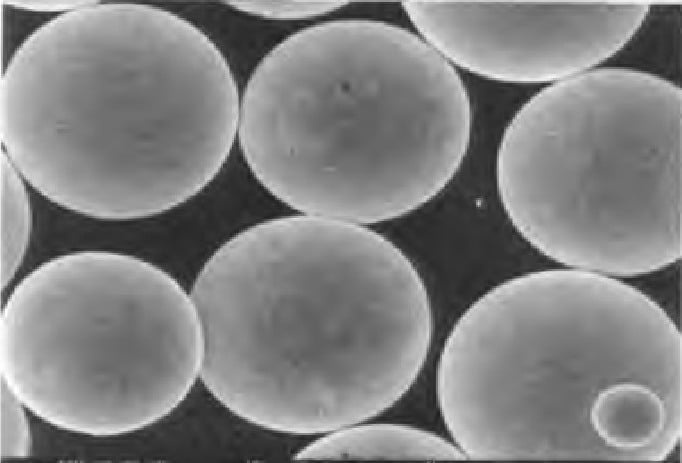
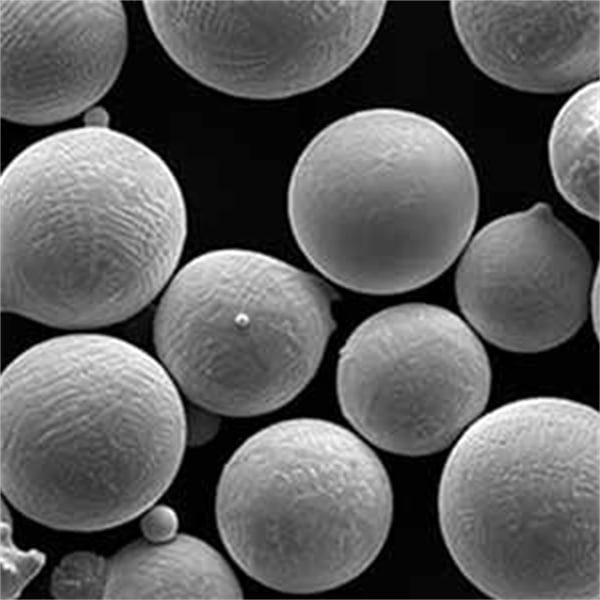
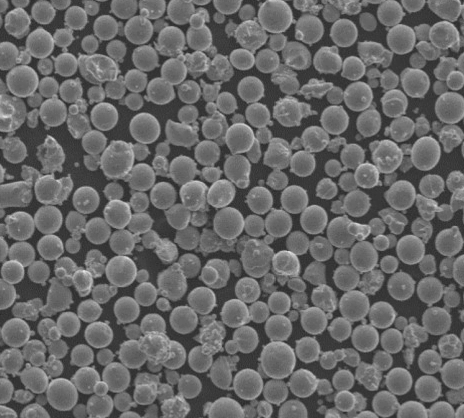
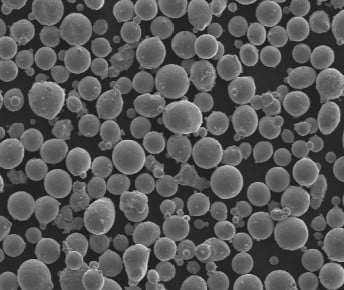

Applications de la Poudre d'alliages de titane
The versatility of titanium alloys powder is reflected in their wide range of applications. From the wings of aircraft to the implants in our bodies, these powders play a crucial role in many advanced technologies.
Applications Across Industries:
| Industrie | Exemples d’application |
|---|---|
| Aérospatial | Aircraft frames, engine components, fasteners, landing gear. |
| Médical | Dental implants, hip and knee replacements, surgical instruments, pacemaker cases. |
| Automobile | High-performance engine parts, exhaust systems, suspension components. |
| Équipement sportif | Bicycle frames, golf club heads, tennis racquets, protective gear. |
| Marine | Ship hulls, propellers, offshore drilling components, underwater pipelines. |
| Industriel | Chemical processing equipment, heat exchangers, pressure vessels, power generation components. |
| Électronique grand public | Laptop cases, smartphone frames, eyewear, watches. |
| L'énergie | Wind turbine components, nuclear reactor parts, oil and gas exploration equipment. |
| Architecture | Building facades, structural supports, decorative elements. |
Spécifications, tailles, qualités et normes
Titanium alloys powders are available in various specifications, ensuring they meet the stringent requirements of different applications. Here’s a closer look at the details:
Spécifications et normes :
| Spécification | Description |
|---|---|
| ASTM B348 | Standard specification for titanium and titanium alloy bars and billets. |
| AMS 4928 | Aerospace Material Specification for titanium alloy bars, wire, forgings, and rings. |
| ISO 5832-3 | Implants for surgery – titanium 6-aluminum 4-vanadium alloy. |
| MIL-T-9047 | Military specification for titanium and titanium alloy bar, rod, wire, and forging stock. |
| BS EN 10204 | Metallic products – types of inspection documents. |
| ISO 9001 | Quality management systems – requirements for consistent product quality. |
Tailles et qualités :
| Qualité | Composition | Gamme de taille des particules | Pureté |
|---|---|---|---|
| Première année | Titane pur | 15-45 microns | 99.5% |
| Niveau 2 | Titane pur | 15-45 microns | 99.2% |
| 5e année | Ti-6Al-4V | 15-45 microns | 99.0% |
| 9e année | Ti-3Al-2,5V | 15-45 microns | 99.0% |
| Grade 23 | Ti-6Al-4V ELI | 15-45 microns | 99.0% |
| Custom | Varies by application | Personnalisable | Personnalisable |
Fournisseurs et détails des prix
The market for titanium alloys powder includes numerous suppliers, each offering different grades, sizes, and prices. Below is a summary of some leading suppliers and their offerings.
Fournisseurs et prix :
| Fournisseur | Gamme de produits | Gamme de prix | Contact |
|---|---|---|---|
| Praxair Surface Technologies | Ti-6Al-4V, Ti-5Al-2,5Sn | $100 - $200 par kg | www.praxairsurfacetechnologies.com |
| Sandvik | Various titanium alloys powders | $150 – $250 per kg | www.materials.sandvik |
| Technologie des charpentiers | Custom alloys | $120 – $220 per kg | www.carpentertechnology.com |
| Höganäs AB | Pure and alloyed titanium powders | $130 – $240 per kg | www.hoganas.com |
| ATI Powder Metals | Ti-6Al-4V, Ti-15Mo, custom compositions | $140 – $260 per kg | www.atimetals.com |
| Poudres et revêtements avancés | High-purity titanium powders | $150 – $270 per kg | www.apc-powders.com |
| AP&C (GE Additive) | Poudres pour la fabrication additive | $160 – $280 per kg | www.ge.com/additive |
Comparer le pour et le contre, les avantages et les limites
While titanium alloys powder offers many benefits, it also has certain limitations. Here’s a balanced look at the pros and cons:
Advantages vs. Limitations:
| Aspect | Avantages | Restrictions |
|---|---|---|
| Force | Exceptional strength-to-weight ratio, ideal for load-bearing applications. | Can be difficult to machine, requiring specialized tools and techniques. |
| Résistance à la corrosion | High resistance to corrosion, even in harsh environments like seawater. | More expensive compared to some other materials like aluminum or steel. |
| biocompatibilité | Excellent for medical implants due to its compatibility with the human body. | Requires stringent quality control and certification for medical applications. |
| Stabilité thermique | Maintains properties at high temperatures, making it suitable for aerospace applications. | Limited availability of high-temperature grades, which can be costly. |
| Usinabilité | Can be formed into complex shapes, especially through additive manufacturing. | Some titanium alloys are more challenging to machine, leading to higher production costs. |
| Recyclabilité | Highly recyclable, reducing environmental impact and promoting sustainability. | Recycling processes can be energy-intensive and require specialized facilities. |
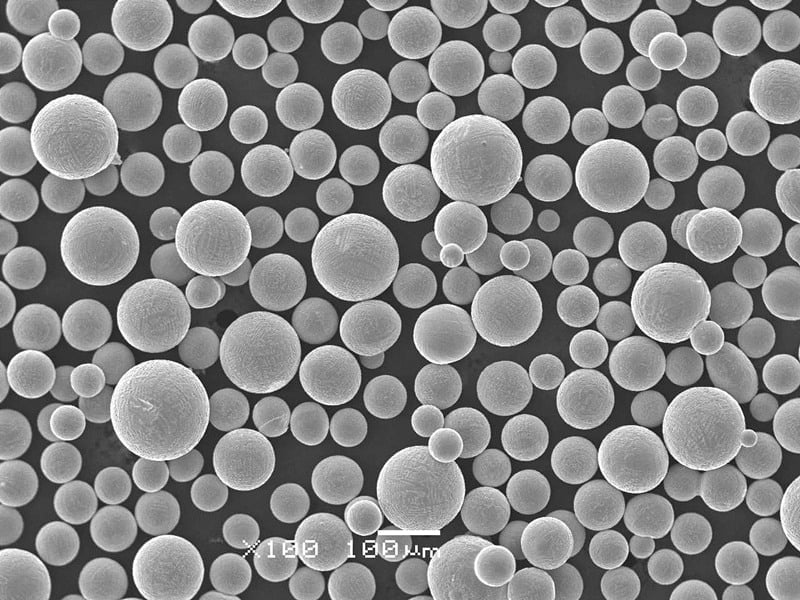
Réflexions et exemples
To truly appreciate the value of titanium alloys powder, let’s dive into some real-world examples and insights.
Aerospace Innovations
In the aerospace industry, the use of titanium alloys powder has revolutionized manufacturing. For instance, jet engine components made from Ti-6Al-4V powder have significantly reduced weight while maintaining high strength and thermal stability. This results in more fuel-efficient engines with longer service lives.
Medical Marvels
In the medical field, titanium alloys powder is a game-changer. Consider the use of Ti-6Al-4V ELI in hip and knee replacements. These implants are not only strong and lightweight but also highly biocompatible, reducing the risk of rejection by the body. This has led to improved patient outcomes and faster recovery times.
Automotive Advancements
The automotive industry is another area where titanium alloys powder is making waves. High-performance cars, like those from Ferrari and Lamborghini, often use Ti-6Al-4V for engine components and exhaust systems. This not only enhances performance but also reduces weight, contributing to better fuel efficiency and handling.
Sports Equipment Evolution
Even in sports equipment, titanium alloys powder is making a significant impact. For example, golf clubs made from Ti-3Al-2.5V offer players better control and power. Similarly, bicycle frames constructed from titanium alloys are prized for their light weight and durability, making them perfect for competitive cycling.
FAQ
Frequently Asked Questions:
| Question | Réponse |
|---|---|
| What is titanium alloys powder used for? | Titanium alloys powder is used in aerospace, medical implants, automotive components, sports equipment, marine applications, and more. |
| Why are titanium alloys powders expensive? | The high cost is due to the complex extraction and production processes, as well as the superior properties like strength and corrosion resistance. |
| How are titanium alloys powders made? | They are typically made through processes like gas atomization, plasma atomization, and mechanical alloying, ensuring fine, uniform particles. |
| Can titanium alloys powder be recycled? | Yes, titanium alloys are highly recyclable, which helps reduce the environmental impact and conserve resources. |
| What is the difference between pure titanium and titanium alloys? | Pure titanium consists of almost entirely titanium, while titanium alloys are a mixture of titanium and other elements like aluminum, vanadium, and molybdenum. |
| Is titanium alloys powder safe for medical applications? | Yes, certain titanium alloys like Ti-6Al-4V ELI are biocompatible and safe for medical implants and devices. |
| What are the challenges in machining titanium alloys powder? | Machining can be challenging due to the material’s hardness and tendency to wear out tools quickly, requiring specialized equipment and techniques. |
| How do I choose the right titanium alloy powder for my application? | Consider the specific properties needed, such as strength, corrosion resistance, and temperature stability, and consult with suppliers for recommendations. |
| What are the environmental benefits of using titanium alloys powder? | Titanium is recyclable, has a long lifespan, and reduces weight in applications, contributing to lower fuel consumption and emissions. |
| Where can I buy titanium alloys powder? | You can purchase from various suppliers like Praxair Surface Technologies, Sandvik, Carpenter Technology, and more, depending on your specific needs. |
Conclusion
Titanium alloys powder is a marvel of modern materials science, offering unparalleled strength, weight efficiency, and versatility. From high-flying aircraft to life-saving medical implants, these powders are at the heart of many cutting-edge technologies. By understanding their properties, applications, and benefits, you can make informed decisions about their use in your projects. Whether you’re in aerospace, medical, automotive, or any other industry, titanium alloys powder is sure to offer solutions that meet and exceed your expectations.
À propos de 3DP mETAL
Catégorie de produits
CONTACTEZ-NOUS
Des questions ? Envoyez-nous un message maintenant ! Après avoir reçu votre message, nous traiterons votre demande avec toute une équipe.
